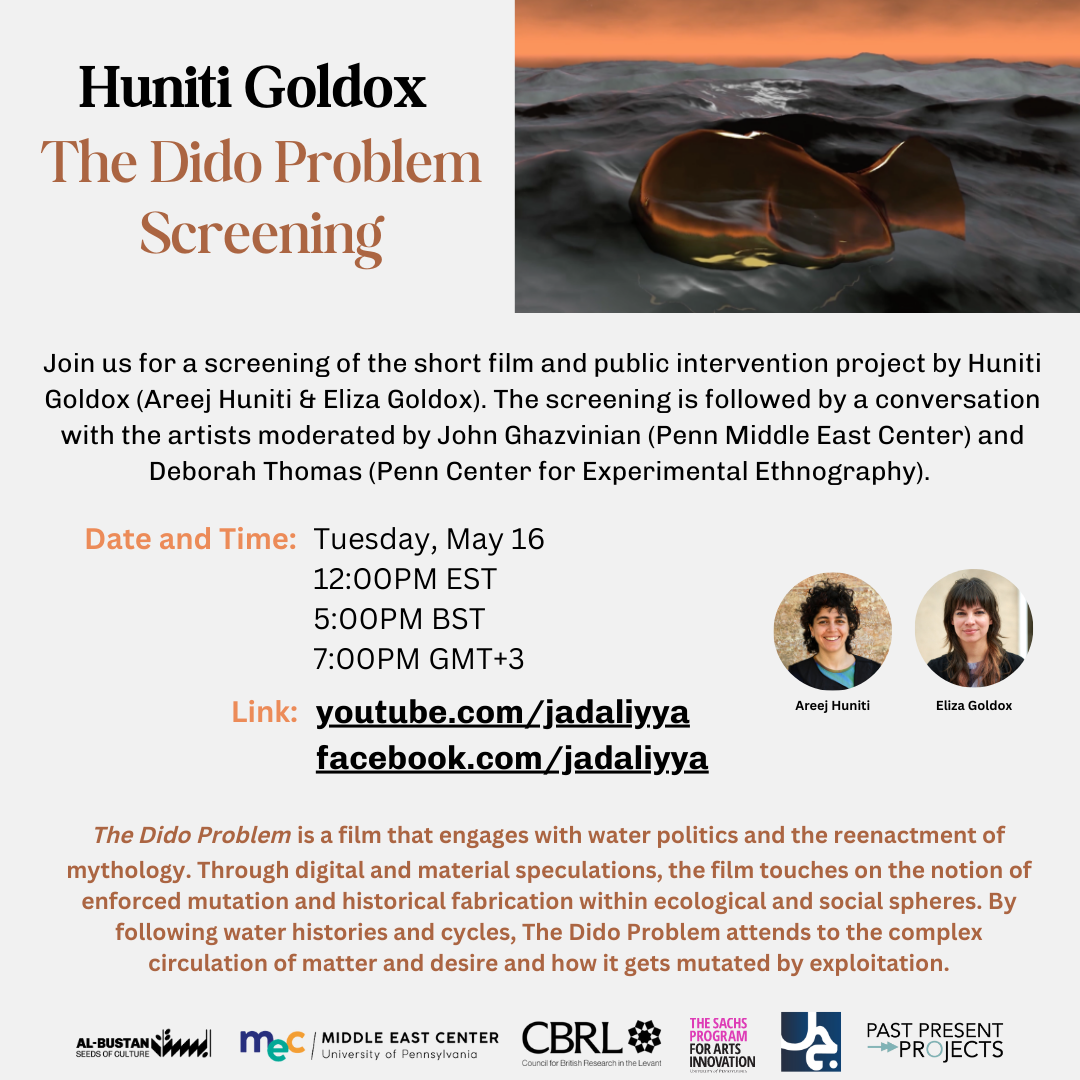Middle East and Islamic Studies Program Presents
Geographies of the Future:
Traveling the Arab Majority World in Virtual Reality
Featuring Jessica Holland and Bridget Guarasci
Moderated by Camille Cole and Bassam Haddad
Co-sponsored by:
The Arab Studies Institute, Global Affairs, and Schar School of Policy and Government
Geographies of the Future: Traveling the Arab Majority World in Virtual Reality is an exhibit curated by Jessica Holland and Bridget Guarasci. It experiments with virtual media to render possible impossible worlds. Artists participating in the exhibit reimagine geographies of the Arab-majority world in order to analyze political violence or to chart anew known landscapes.
The exhibit aims to harness and redeploy technologies—from mapping to virtual reality to gaming—that have defined regional geographies according to imperial interests. Artists in the exhibit render a geography of the Arab majority world that refuses received categories of representation and articulates unexpected futures.
Featuring
Jessica Holland is the Manager of Knowledge Production and Pedagogy at the Forum on Arab and Muslim Affairs, part of the Arab Studies Institute. Jessica is also co-curator of the upcoming exhibition “Geographies of the Future: Traveling the Arab World in Virtual Reality (2024). Jessica was formerly the project co-lead for a digitization and online education project, the ACOR Digital Archive in Amman, Jordan. Jessica gained an MA with distinction in Middle Eastern Studies and Arabic from SOAS, University of London, in 2018. She presented her dissertation on decolonial ‘affordances’ within the digital archive to peers at Photo Archives VII conference, organized by NYU Dhabi Institut in Florence (2019). Jessica received her BA in History of Art from the University of Cambridge in 2013.
Bridget Guarasci is Assistant Professor of Anthropology at Franklin & Marshall College and a 2021-2022 Wenner-Gren Hunt Postdoctoral Scholar. She is an environmental anthropologist whose work examines how war and conflict create ecological life in the Arab majority world. At first blush, nature and war might appear to be oxymoronic. People commonly think of nature as teeming with life. Wetlands are seen as transitional spaces between land and sea where migrating birds alight unifying biodiversity hotspots across the globe during seasonal migrations. Nature in this sense conveys an image of peace and tranquility. War is conceptualized as almost its exact opposite. Rife with bombs, artillery, pain, and suffering, war tears through the social fabric to destroy life and livelihood. Guarasci’s work demonstrates that contrary to popular thinking nature and war are not paradoxical, but entangled processes of making and harnessing the biosphere. Her scholarship analyzes how the material effects of emplacing water ecologies is a form of political violence.
Moderated by
Camille Cole is a PhD candidate in History at Yale University. Her dissertation, “Empire on Edge: Land, Law, and Capital in Gilded Age Basra,” examines how wealthy elites in late Ottoman Basra used state tools and vocabularies alongside legal and illegal environmental manipulation and novel financial practices to accumulate land. Her work can be found in the Journal of Social History, Middle Eastern Studies, and South Asian History and Culture. Beginning in Fall 2020, she will be a Junior Research Fellow at Jesus College, Cambridge.
Bassam Haddad is Director of the Middle East and Islamic Studies Program and Associate Professor at the Schar School of Policy and Government at George Mason University. He is the author of Business Networks in Syria: The Political Economy of Authoritarian Resilience (Stanford University Press, 2011) and co-editor of A Critical Political Economy of the Middle East (Stanford University Press, 2021). Bassam is Co-Founder/Editor of Jadaliyya Ezine and Executive Director of the Arab Studies Institute. He serves as Founding Editor of the Arab Studies Journal and the Knowledge Production Project. He is co-producer/director of the award-winning documentary film, About Baghdad, and director of the acclaimed series Arabs and Terrorism. Bassam serves on the Board of the Arab Council for the Social Sciences and is Executive Producer of Status Audio Magazine and Director of the Middle East Studies Pedagogy Initiative (MESPI). He received MESA's Jere L. Bacharach Service Award in 2017 for his service to the profession. Currently, Bassam is working on his second Syria book titled Understanding the Syrian Tragedy: Regime, Opposition, Outsiders (forthcoming, Stanford University Press).

